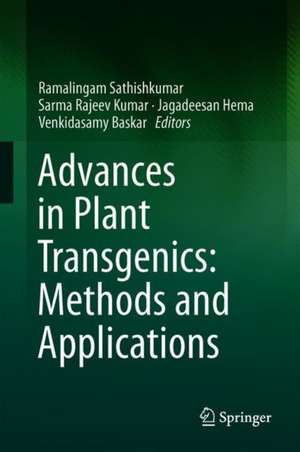Advances in Plant Transgenics: Methods and Applications
Editat de Ramalingam Sathishkumar, Sarma Rajeev Kumar, Jagadeesan Hema, Venkidasamy Baskaren Limba Engleză Hardback – 25 noi 2019
This book discusses the commercial applications of plant transgenic technologies, including the use of transgenic cell culture approachesto improve the production of metabolites and high-value therapeutics as well as transgenic plants in pest management. It also explores generation of novel vectors, protein production using chloroplast engineering and the latest developments in this area, such as genome editing in plants. Featuring general discussions and research papers by leading international experts, it is a valuable resource for scientists, teachers, students and industrialists working in the field.
| Toate formatele și edițiile | Preț | Express |
|---|---|---|
| Paperback (1) | 790.47 lei 39-44 zile | |
| Springer Nature Singapore – 25 noi 2020 | 790.47 lei 39-44 zile | |
| Hardback (1) | 805.56 lei 39-44 zile | |
| Springer Nature Singapore – 25 noi 2019 | 805.56 lei 39-44 zile |
Preț: 805.56 lei
Preț vechi: 1059.94 lei
-24% Nou
Puncte Express: 1208
Preț estimativ în valută:
154.25€ • 159.11$ • 127.84£
154.25€ • 159.11$ • 127.84£
Carte tipărită la comandă
Livrare economică 17-22 februarie
Preluare comenzi: 021 569.72.76
Specificații
ISBN-13: 9789811396236
ISBN-10: 981139623X
Pagini: 385
Ilustrații: XXII, 366 p. 26 illus., 23 illus. in color.
Dimensiuni: 155 x 235 mm
Ediția:1st ed. 2019
Editura: Springer Nature Singapore
Colecția Springer
Locul publicării:Singapore, Singapore
ISBN-10: 981139623X
Pagini: 385
Ilustrații: XXII, 366 p. 26 illus., 23 illus. in color.
Dimensiuni: 155 x 235 mm
Ediția:1st ed. 2019
Editura: Springer Nature Singapore
Colecția Springer
Locul publicării:Singapore, Singapore
Cuprins
Chapter 1. Plant Tissue Culture and DNA Delivery Methods.- Chapter 2. Cell Cultures and Hairy Roots as Platform for Production of High Value Metabolites: Current Approaches, Limitations and Future Prospects.- Chapter 3. Integrating Bioinformatics and Omics tools for systems analysis of abiotic stress tolerance in Oryza sativa (L.).- Chapter 4. Green Biotechnology: A brief update on Plastid Genome Engineering.- Chapter 5. New Generation Transformation Vectors.- 6 Recent Developments in Generation of Marker Free Transgenic Plants.- Chapter 7. Applications of Genome Engineering/Editing Tools in Plants.- Chapter 8. High Throughput Analytical Techniques to Screen Plant Transgenics.- Chapter 9. Transgenic Technologies and their Potential Application in Horticultural Crop Improvement.- Chapter 10. Commercial Application of Transgenic Plants in Virus Management.- Chapter 11. Application of Reed Beds in Wastewater Treatment: Scope for Transgenic Plants.- Chapter 12. Inspection of Crop Wild Relative (Cicer microphyllum) as Potential Genetic Resource in Transgenic Development.- Chapter 13. Genome Modification Approaches to Improve Performance, Quality and Stress Tolerance of Mediterranean Fruit Species.- Chapter 14. Key Challenges in Developing Products from Transgenic Plants.- Chapter 15. Enhanced Production of Therapeutic Proteins in Plants: Novel Expression Strategies.- Chapter 16. Transcriptional Engineering for Enhancing Valuable Metabolites in Photosynthetic Microalgae.
Notă biografică
Dr. R. Sathishkumar is currently a Professor of Biotechnology at Bharathiar University, India. He holds PhD from School of Biological Sciences, Madurai Kamaraj University, India and gained Post- doctoral training from The University of Hong Kong, Hong Kong. The thrust area of his research includes Plant Molecular Farming, Plant Metabolic Engineering and DNA Barcoding. He has supervised 12 PhD’s and mentored 4 Post-doctoral fellows till now. He has secured both national and international funding for his research. He has a US patent and filed an Indian patent. To his credit he has 70 peer reviewed journal and 22 book chapter publications. Recently, he was elected as a subcommittee member on DNA barcoding by Indian Pharmacopeia Commission (IPC), Government of India. He is a consultant for many of the Indian herbal industries.
Textul de pe ultima copertă
The green revolution led to the development of improved varieties of crops, especially cereals, and since then, classical or molecular breeding has resulted in the creation of economically valuable species. Thanks to recent developments in genetic engineering, it has become possible to introduce genes from different sources, such as bacteria, fungi, viruses, mice and humans, to plants. This technology has made the scientific community aware of the critical role of transgenics, not only as a means of producing stress tolerant crops but also as a platform for the production of therapeutics through molecular farming.
This book discusses the commercial applications of plant transgenic technologies, including the use of transgenic cell culture approachesto improve the production of metabolites and high-value therapeutics as well as transgenic plants in pest management. It also explores generation of novel vectors, protein production using chloroplast engineering and the latest developments in this area, such as genome editing in plants. Featuring general discussions and research papers by leading international experts, it is a valuable resource for scientists, teachers, students and industrialists working in the field.
This book discusses the commercial applications of plant transgenic technologies, including the use of transgenic cell culture approachesto improve the production of metabolites and high-value therapeutics as well as transgenic plants in pest management. It also explores generation of novel vectors, protein production using chloroplast engineering and the latest developments in this area, such as genome editing in plants. Featuring general discussions and research papers by leading international experts, it is a valuable resource for scientists, teachers, students and industrialists working in the field.
Caracteristici
Covers the recent advances made in very potential plant genetic engineering which will be unique of its kind Discusses the challenges and prospects in plant biotechnology, which would be useful for future biotechnologists Explains biosafety concerns and business management of transgenic products
